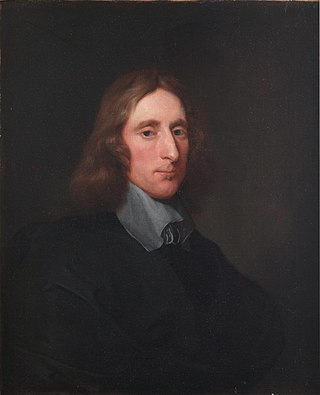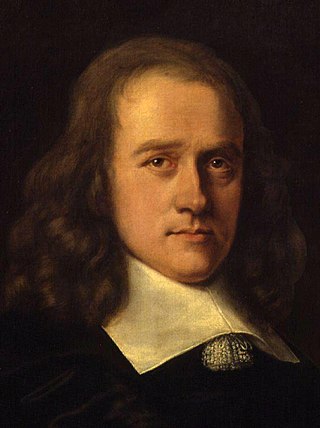Related Research Articles

The Commonwealth was the political structure during the period from 1649 to 1660 when England and Wales, later along with Ireland and Scotland, were governed as a republic after the end of the Second English Civil War and the trial and execution of Charles I. The republic's existence was declared through "An Act declaring England to be a Commonwealth", adopted by the Rump Parliament on 19 May 1649. Power in the early Commonwealth was vested primarily in the Parliament and a Council of State. During the period, fighting continued, particularly in Ireland and Scotland, between the parliamentary forces and those opposed to them, in the Cromwellian conquest of Ireland and the Anglo-Scottish war of 1650–1652.

Oliver Cromwell was an English statesman, politician and soldier, widely regarded as one of the most important figures in the history of the British Isles. He came to prominence during the 1639 to 1653 Wars of the Three Kingdoms, initially as a senior commander in the Parliamentarian army and latterly as a politician. A leading advocate of the execution of Charles I in January 1649, which led to the establishment of The Protectorate, he ruled as Lord Protector from December 1653 until his death in September 1658. Cromwell remains a controversial figure due to his use of the army to acquire political power, and the brutality of his 1649 campaign in Ireland.

1653 (MDCLIII) was a common year starting on Wednesday of the Gregorian calendar and a common year starting on Saturday of the Julian calendar, the 1653rd year of the Common Era (CE) and Anno Domini (AD) designations, the 653rd year of the 2nd millennium, the 53rd year of the 17th century, and the 4th year of the 1650s decade. As of the start of 1653, the Gregorian calendar was 10 days ahead of the Julian calendar, which remained in localized use until 1923.

Richard Cromwell was an English statesman and the second and final Lord Protector of the Commonwealth of England, Scotland and Ireland, the son of the first Lord Protector, Oliver Cromwell.

Lord Protector was a title that has been used in British constitutional law for the head of state. It was also a particular title for the British heads of state in respect to the established church. It was sometimes used to refer to holders of other temporary posts; for example, a regent acting for the absent monarch.

The First Anglo-Dutch War, or First Dutch War, was a naval conflict between the Commonwealth of England and Dutch Republic. Largely caused by disputes over trade, it began with English attacks on Dutch merchant shipping, but expanded to vast fleet actions. Despite a series of victories in 1652 and 1653, the Commonwealth was unable to blockade Dutch trade, although English privateers inflicted serious losses on Dutch merchant shipping.

The Anglo–Dutch Wars were a series of conflicts mainly fought between the Dutch Republic and England in the mid-17th and late 18th century. The first three wars occurred in the second half of the 17th century over trade and overseas colonies, while the fourth was fought a century later. Almost all the battles were naval engagements.

The Protectorate, officially the Commonwealth of England, Scotland and Ireland, was the English form of government lasting from 16 December 1653 to 25 May 1659, under which the kingdoms of England, Scotland, and Ireland, with their associated territories were joined together in the Commonwealth of England, governed by a Lord Protector. It began when Barebone's Parliament was dissolved, and the Instrument of Government appointed Oliver Cromwell as Lord Protector of the Commonwealth. Cromwell died in September 1658 and was succeeded by his son Richard Cromwell.

George Monck, 1st Duke of Albemarle KG PC JP was an English soldier, who fought on both sides during the Wars of the Three Kingdoms. A prominent military figure under the Commonwealth, his support was crucial to the Restoration of Charles II in 1660, who rewarded him with the title Duke of Albemarle and other senior positions.

The naval Battle of Portland, or Three Days' Battle, took place during 18–20 February 1653, during the First Anglo-Dutch War, when the fleet of the Commonwealth of England under General at Sea Robert Blake was attacked by a fleet of the Dutch Republic under Lieutenant-Admiral Maarten Tromp escorting merchant shipping through the English Channel.

The Battle of the Gabbard, was a naval battle fought from 2 to 3 June 1653 during the First Anglo-Dutch War. It took place near the Gabbard shoal off the coast of Suffolk, England, between fleets of the Commonwealth of England and the Dutch Republic. It resulted in a decisive English victory.

John Thurloe was an English politician who served as secretary to the council of state in Protectorate England and spymaster for Oliver Cromwell and held the position of Postmaster General between 1655 and 1660. He was from Great Milton in Oxfordshire and of Lincoln's Inn,

Sir Oliver St John was an English judge and politician who sat in the House of Commons from 1640-53. He supported the Parliamentary cause in the English Civil War.
"Oliver Cromwell" is a song recorded by Monty Python in 1980 but not released until 1989 where it featured on their compilation album Monty Python Sings. John Cleese, who wrote the lyric, debuted the song in the episode of the radio show I'm Sorry, I'll Read That Again broadcast on 2 February 1969, when it was introduced as "The Ballad of Oliver Cromwell". It is sung to Frédéric Chopin's Heroic Polonaise, and documents the career of British statesman Oliver Cromwell, from his service as Member of Parliament (MP) for Huntingdon to his installation as Lord Protector of the Commonwealth of England. The lead vocals, often heavily multi-tracked, are performed by Cleese, with interjections by Eric Idle.
Events from the year 1659 in England.
Events from the year 1654 in England.
Events from the year 1657 in England.
Events from the year 1658 in England.
Vice-Admiral Sir Richard Stayner (1625–1662) was an English naval officer who supported the Parliamentary cause during the English Civil War and the Interregnum. During the First Anglo-Dutch War he commanded the Foresight in actions at Portland, the Gabbard and in the Battle of Scheveningen. During the Anglo-Spanish War (1654–1660), he won renown and a fortune in prize money when he captured a great part of the Spanish West Indian treasure fleet off Cadiz in 1656. He was knighted by the Lord Protector Oliver Cromwell for services in Admiral Robert Blake's destruction of Spanish ships at Santa Cruz, 1657. He was a rear-admiral of the fleet which brought Charles II to England in 1660. He was again knighted at the Restoration. He died at Lisbon, while serving as vice-admiral of the Mediterranean fleet.
Vice Admiral William Goodsonn, also William Goodson, was an English naval officer.
References
- ↑ Palmer, Alan; Palmer, Veronica (1992). The Chronology of British History. London: Century Ltd. pp. 185–186. ISBN 0-7126-5616-2.
- ↑ Venning, Timothy (2004). "Thurloe, John (bap. 1616, d. 1668)". Oxford Dictionary of National Biography . Oxford University Press. doi:10.1093/ref:odnb/27405 . Retrieved 2012-07-10.(subscription or UK public library membership required)
- ↑ Penguin Pocket On This Day. Penguin Reference Library. 2006. ISBN 0-14-102715-0.
- ↑ "Commonwealth Instrument of Government, 1653". Modern History Sourcebook. New York: Fordham University. August 1998. Retrieved 2012-07-10.
- ↑ "Thomas Pitt | British merchant". Encyclopedia Britannica. Retrieved 20 September 2021.